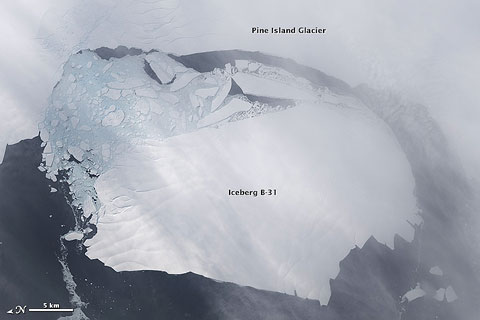Warsaw has seen a deluge of important climate-related information released — so much that it’s been difficult to keep up — but still not enough to steel negotiators to reach an equitable arrangement that gives us all a chance at a reasonable future climate. And at the same time, the planet has been sending signals that it’s not happy. The Pine Island glacier has finally calved the giant iceberg that first started to shown signs of cracking away from the ice stream a couple of years ago. Iceberg B-31 has been described as being the size of Singapore (about 700 km2), but isn’t likely to move far from Pine Island Bay in the near future. NASA Earth Observatory coverage here and here; see also Telegraph (UK) and Antarctic Sun.
The Global Carbon Project announced earlier this week that greenhouse gas emissions are projected to reach the highest level in human history this year — 36 billion tonnes. There are some encouraging signs that the rate of growth may be slowing, but nowhere near enough to enable the planet to avoid hitting a two degree rise in the first half of this century. There’s an excellent visualisation of national emissions at the Global Carbon Atlas (and at the Guardian). See also The Age, Think Progress.
All that carbon has to go somewhere, and the global oceans are doing us a big favour by absorbing a lot of it. Unfortunately, there’s a big downside: the oceans are becoming more acidic, and at a rate faster than at any time in the last 55 million years. The prospects for marine ecosystems look bleak if we can’t kick the fossil fuel habit, according to a Summary For Policymakers [pdf] released by the Intergovernmental Oceangraphic Commission last week.
Regular Hot Topic readers will know that I’ve never been much persuaded by talk of a “pause” in global warming’s progress. If global warming stopped in the 1990s, why has the last ten years been the warmest in the long term record, and why has the ice kept on melting? To put the final nail in the pause’s coffin, Kevin Cowtan from the University of York and Robert Way from the University of Ottawa (both stalwarts at Skeptical Science), looked at global temperature records and found ways of compensating for the temperature data missing from the Arctic and Africa. Here’s Cowtan, explaining what they did.
[youtube http://www.youtube.com/watch?v=GhJR3ywIijo&w=480]
Net result: existing temperature data series underestimate recent warming by half. If that’s all straightforward enough, take a moment to consider what will happen to warming when the factors that have been acting to restrict warming swing to the opposite phase. We’ll be heading into the unknown, and at high speed. See Real Climate, Dana Nucitelli at the Guardian, and Science Daily.
And finally: this is the time of year when the World Meteorological Association releases its preliminary look at the weather and climate events of the current year. It’s not a pretty sight. 2013 is tracking along to be the 7th warmest year in the long term record. WMO Secretary-General Michel Jarraud noted: “the coldest years now are warmer than the hottest years before 1998.” Another reason to kiss the pause meme goodbye. See Climate Central, Guardian.


This is interesting: Nick Stokes does more with Cowtan and Way.
RIP ‘Pause’, then.
Dear Idiots; at some point, you really will have to acknowledge the problem will not go away, no matter how hard you wish it to. Every day of inaction makes the future just that incremental bit worse, and lessens the chance that the future world will much resemble this one. Particularly with regard to your much-vaunted Democratic Right to be just as stupid as you see fit…
The pause appears to be non existant. I see the situation in the following way. All the natural factors over the last decade or so have been cooling such as low sunspot numbers, an extended la nina cycle (simplifying) increased particulate emissions yet the temperature has increased markedly.
This suggests a powerful forcing from greenhouse gases. Am I missing something here? No Im not.
The disappearance of the “pause” or “hiatus” should still be thought of cautiously.
The case for action is so solid every top level scientific organization in the world has signed on to calls for civilization to phase out carbon emissions as quickly as possible to stabilize the composition of the atmosphere at a GHG level as low as possible, repeatedly.
I’m wondering how people can claim to know what is going on in areas where there are no measurements. When types like Trenberth were attempting to explain why there was a “hiatus” over a period less then 25 years, it seemed weird. He signed off on as an IPCC lead author in an IPCC report) that statements about global temperature trends lacked meaning unless they described periods of 25 years or longer, I wondered do they need their heads examined?
And I wonder now, why the fuss over an assessment that states that if you massage the zero data areas into the assessments of areas where there is data, the “hiatus” that wasn’t there in the first place according to my reading of the existing IPCC documents, “disappears”.
Anyway, we’re on the roller coaster to Hell, as members of a species too stupid to survive. This must have been what it felt like in last decades before Rome was sacked. The Fall of Rome on Fast Forward – here we are.